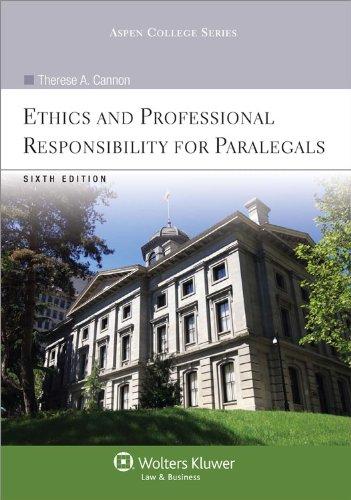Petersen, a nonattorney, has worked in Manti, Utah, since 1991. During that time, he has prepared wills,
Question:
Petersen, a nonattorney, has worked in Manti, Utah, since 1991.
During that time, he has prepared wills, divorce papers, and pleadings and conducted legal research on behalf of clients for a fee. Petersen also advertised his services in local publications. Just prior to moving to Manti, Petersen had completed a nine-month correspondence course through the N.R.I. Paralegal School. Petersen subsequently registered as a paralegal through the National Paralegal Association, the Pennsylvania organization which offered the correspondence course. However, Petersen was never employed by an attorney, and none of his law-related work was supervised by an attorney. Petersen’s activities were brought to the attention of the Board of Bar Commissioners of the Utah State Bar, and the Bar filed a formal complaint in 1993. The Bar claimed that Petersen has engaged in the unauthorized practice of law in violation of section 78-51-25 of the Utah Code and sought a permanent injunction against him. Section 78-51-25 of the Utah Code states in relevant part as follows:
No person who is not duly admitted and licensed to practice law within this state . . . shall practice or assume to hold himself out to the public as a person qualified to practice or carry on the calling of a lawyer within the state.
Petersen filed two pretrial motions to have section 78-51-25 declared unconstitutional. . . . The trial court denied both motions.
The case was tried to a jury. . . . The jury returned a verdict in favor of the Bar and against Petersen, and the court ordered Petersen to stop the unauthorized practice of law. . . .
On appeal, Petersen argues that section 78-51-25 is constitutionally vague, . . . overbroad, . . . [and that it] violates the separation of powers doctrine . . . by purporting to authorize the legislature to pass a law that regulates the unauthorized practice of law. . . .
Petersen claims that an ordinary reader would not understand . . .
section 78-51-25 to prohibit the kinds of activities in which he was engaged. He asserts that the obvious reading of the statute is that a nonlawyer is prohibited from either claiming to be or working as a lawyer, neither of which Petersen did. . . . We disagree. . . . The obvious reading of the statute is that unless a person is licensed to practice law within the state, he cannot practice as a lawyer, act as a lawyer, or even present himself to the public as a person qualified to act as a lawyer. . . .
Although ‘‘the practice of law’’ has not been exactly defined, an
‘‘ordinary reader’’ would understand that certain services, when performed on someone else’s behalf, are part of such practice. Such services would include not only appearing in court, but also drafting complaints, drafting or negotiating contracts, drafting wills, counseling or giving legal advice on matters, and many other things. . . .
Further, when such services are performed for a fee, it is even more likely that they constitute the practice of law. . . .
Petersen’s conduct falls within the clear sanction of section 78-51-25.
Although not licensed to practice law, he met with and counseled clients on how best to proceed.......
Questions about the Case 1 What were the paralegal’s educational credentials? Was Mr. Petersen a paralegal as that term is commonly understood in your state? Did he work under lawyer supervision?
2 What was Mr. Petersen charged with, and what sanction was imposed by the trial court?
3 What were the three arguments with which he defended himself against the UPL charge? Set forth each argument and the response of the court to each argument. Do you agree with the court’s analysis or Mr. Petersen’s?
4 Think back to the separation of powers discussion in Chapter 1.
Does it make sense to you that the court has authority over the practice of law and the legislature over the ‘‘unauthorized’’ practice of law? Note the recent court rules about unauthorized practice that are referenced in this chapter. Do most states embrace this distinction?
Step by Step Answer:

Ethics And Professional Responsibility For Paralegals
ISBN: 272860
6th Edition
Authors: Therese A. Cannon





